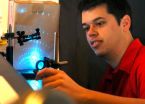(Press-News.org) Soaring energy consumption by ever more powerful computers, data centers and mobile devices has many experts looking to reduce the energy use of these devices. Most projects so far focus on more efficient cooling systems or energy-saving power modes.
A University of Washington project sees a role for programmers to reduce the energy appetite of the ones and zeroes in the code itself. Researchers have created a system, called EnergJ, that reduces energy consumption in simulations by up to 50 percent, and has the potential to cut energy by as much as 90 percent. They will present the research next week in San Jose at the Programming Language Design and Implementation annual meeting.
"We all know that energy consumption is a big problem," said author Luis Ceze, a UW assistant professor of computer science and engineering. "With our system, mobile phone users would notice either a smaller phone, or a longer battery life, or both. Computing centers would notice a lower energy bill."
The basic idea is to take advantage of processes that can survive tiny errors that happen when, say, voltage is decreased or correctness checks are relaxed. Some examples of possible applications are streaming audio and video, games and real-time image recognition for augmented-reality applications on mobile devices.
"Image recognition already needs to be tolerant of little problems, like a speck of dust on the screen," said co-author Adrian Sampson, a UW doctoral student in computer science and engineering. "If we introduce a few more dots on the image because of errors, the algorithm should still work correctly, and we can save energy."
The UW system is a general framework that creates two interlocking pieces of code. One is the precise part – for instance, the encryption on your bank account's password. The other portion is for all the processes that could survive occasional slipups.
The software creates an impenetrable barrier between the two pieces.
"We make it impossible to leak data from the approximate part into the precise part," Sampson said. "You're completely guaranteed that can't happen."
While computers' energy use is frustrating and expensive, there is also a more fundamental issue at stake. Some experts believe we are approaching a limit on the number of transistors that can run on a single microchip. The so-called "dark silicon problem" says that as we boost computer speeds by cramming more transistors onto each chip, there may no longer be any way to supply enough power to the chip to run all the transistors.
The UW team's approach would work like a dimmer switch, letting some transistors run at a lower voltage. Approximate tasks could run on the dimmer regions of the chip.
"When I started thinking about this, it became more and more obvious that this could be applied, at least a little bit, to almost everything," Sampson said. "It seemed like I was always finding new places where it could be applied, at least in a limited way."
Researchers would use the program with a new type of hardware where some transistors have a lower voltage, the force on electrons in the circuit. This slightly increases the risk of random errors; EnerJ shuttles only approximate tasks to these transistors.
"If you can afford one error every 100,000 operations or so, you can already save a lot of energy," Ceze said.
Other ways to use hardware to save energy are lowering the refresh rate and reducing voltage of the memory chip.
Simulations of such hardware show that running EnerJ would cut energy by about 20 to 25 percent, on average, depending on the aggressiveness of the approach. For one program the energy saved was almost 50 percent. Researchers are now designing hardware to test their results in the lab.
Today's computers could also use EnerJ with a purely software-based approach. For example, the computer could round off numbers or skip some extra accuracy checks on the approximate part of the code to save energy – researchers estimate between 30 and 50 percent savings based on software alone.
Combining the software and hardware methods they believe they could cut power use by about 90 percent.
"Our long-term goal would be 10 times improvement in battery life," Ceze said. "I don't think it is totally out of the question to have an order of magnitude reduction if we continue squeezing unnecessary accuracy."
The program is called EnerJ because it is an extension for the Java programming language. The team hopes to release the code as an open-source tool this summer.
INFORMATION:
Co-authors of the paper are UW computer science and engineering professor Dan Grossman, postdoctoral researcher Werner Dietl, graduate student Emily Fortuna and undergraduate Danushen Gnanapragasam. Also involved in the research is doctoral student Hadi Esmaeilzadeh.
For more information, contact Ceze at luisceze@cs.washington.edu or 206-543-1896 and Sampson at asampson@cs.washington.edu or 206-659-7267.
Code green: Energy-efficient programming to curb computers' power use
2011-06-01
ELSE PRESS RELEASES FROM THIS DATE:
Spartanburg SC Hotel Provides Close Lodging to Navy Vets Attending the 34th Mighty Moo Festival
2011-06-01
Hampton Inn Spartanburg - North I-85, a premier Spartanburg SC hotel, offers nearby accommodations to Navy veterans attending the 34th Mighty Moo Festival in Cowpens, South Carolina. The event will be held June 15-18, 2011. The people of Cowpens celebrate their history and honor the veterans and crewmen of the Navy's USS Cowpens CVL25 and the USS Cowpens CG63. The CVL 25 was a WWII era ship nicknamed "Mighty Moo", and the CG63 is a modern naval vessel. Many veterans and their families return each year to attend the four day festival which includes a golf tournament, ...
'Dead' galaxies aren't so dead after all, U-M researchers find
2011-06-01
ANN ARBOR, Mich.---University of Michigan astronomers examined old galaxies and were surprised to discover that they are still making new stars. The results provide insights into how galaxies evolve with time.
U-M research fellow Alyson Ford and astronomy professor Joel Bregman presented their findings May 31 at a meeting of the Canadian Astronomical Society in London, Ontario.
Using the Wide Field Camera 3 on the Hubble Space Telescope, they saw individual young stars and star clusters in four galaxies that are about 40 million light years away. One light year is about ...
Hotel in Scottsboro Alabama Offers Nearby Lodging to Travelers Attending First Monday
2011-06-01
Hampton Inn & Suites Hotel Scottsboro offers nearby lodging to travelers attending First Monday Trade Weekend in Scottsboro. Upcoming summer trade days will take place on June 4-6, July 2-4 and July 30 - August 1, 2011 at the Jackson County Courthouse Square. This special trading weekend is a fun activity for visitors to Scottsboro.
First Monday in Scottsboro goes back more than 100 years. It began in 1902 as Horse Swapper's Day. After a rather slow beginning, the event was eventually changed to Market Day to give area farmers a place to sell and trade their goods. ...
Stamping out low cost nanodevices
2011-06-01
A simple technique for stamping patterns invisible to the human eye onto a special class of nanomaterials provides a new, cost-effective way to produce novel devices in areas ranging from drug delivery to solar cells.
The technique was developed by Vanderbilt University engineers and described in the cover article of the May issue of the journal Nano Letters.
The new method works with materials that are riddled with tiny voids that give them unique optical, electrical, chemical and mechanical properties. Imagine a stiff, sponge-like material filled with holes that are ...
Smyrna Georgia Hotel Near Cobb Galleria Provides Lodging to Blade Show & International Cutlery Fair Attendees
2011-06-01
Hampton Inn & Suites Atlanta Galleria hotel, a premier Smyrna Georgia Hotel near Vinings, is an ideal place for travelers to stay who are planning to attend the Blade Show & International Cutlery Fair. The event will be held June 10-12, 2011 at Atlanta's Cobb Galleria Centre. It is the world's largest combined show of handmade, factory and antique knives.
The Blade Show and International Cutlery Fair will showcase over 700 tables and nearly 175 factory booths and products. In addition, the event will feature the Blade Magazine Knife of the Year awards, Blade ...
Atlanta Perimeter Hotel Offers Nearby Lodging to Guests Attending The Monkees at Chastain Park Amphitheater
2011-06-01
The Holiday Inn Express & Suites Atlanta Perimeter Hotel North offers convenient lodging to guests attending The Monkees at Chastain Park Amphitheater on Friday June 3, 2011 at 7:00pm. Part of Delta Classic Chastain Concerts presented by Atlanta Symphony Orchestra, The Monkees 45th Anniversary Tour features original group members Davy Jones, Micky Dolenz and Peter Tork. This is a table set-up concert; coolers and carry-ins are allowed.
The Monkees hit singles and television show debuted 45 years ago. Now in concert again for the first time in a decade, The Monkees ...
Storing seeds for a rainy day -- or in this case, a fire
2011-06-01
As mountain pine beetles march across the forests of western North America, these insects may kill millions of pine trees during a single outbreak. A rise in overall temperatures over the past several years has increased the range of mountain pine beetles, resulting in an epidemic and possibly making this mountain pine beetle infestation the largest forest-insect blight to occur in North America.
Dr. Francois Teste and colleagues from the University of Alberta in Canada have been investigating the effect of mountain pine beetle outbreaks on lodgepole pines in British ...
Kids who bully, are aggressive are twice as likely to have sleep problems
2011-06-01
Ann Arbor, Mich. – Children who are bullies or have conduct problems at school, are more likely to be sleepy during the day according to University of Michigan Medical School researchers.
Researchers looked at elementary school students in the Ypsilanti, Michigan public schools who had exhibited conduct problems like bullying or discipline referrals and found that there was a two-fold higher risk for symptoms of sleep-disordered breathing, particularly daytime sleepiness among these students. The study was published last week in the journal Sleep Medicine.
"What this ...
More than one-third of California teens do not participate in school physical education
2011-06-01
Despite a state requirement that public middle and high school students get 400 minutes of physical education every 10 days, approximately 1.3 million — more than a third (38 percent) of all adolescents enrolled in California public schools — do not participate in any school-based physical education classes, according to a new policy brief from the UCLA Center for Health Policy Research.
Research has shown that a lack of physical activity is associated with obesity, diabetes and other chronic conditions, while regular physical activity is associated with increased ...
Why childhood obesity? It's so much more than what kids eat
2011-06-01
URBANA –University of Illinois scientists from a variety of disciplines have teamed up to examine the factors that contribute to childhood obesity. Why? Because individual researchers have found that the problem is too complicated for any of them to tackle alone.
"Our Strong Kids team members are looking at such diverse factors as genetic predisposition, the effect of breastfeeding, how much TV a child watches, and the neighborhood he lives in, among many others," said Kristen Harrison of the U of I's Division of Nutritional Sciences. "It seems like the answer should ...



